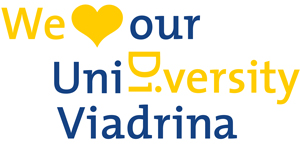Diversity @ Viadrina

What is diversity? Buzzword, fig leaf or genuine strategy? That is what we are currently discussing at Viadrina.
Collegues are working in various groups on recognizing the diversity among students and staff, on using potentials and removing obstacles. From 2018 to 2021 this has been accompanied by an auditing process of the Stifterverband.
Diversi-what? – Some facts & figures to think about:
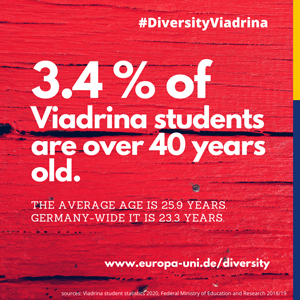 |
How do you picture someone who is studying at university? No matter what gender, hair colour, language or stature – young is the adjective most people associate with students. It is certainly nice to belong to a group of young people who want to learn and storm into life. And yet there are also some who have already completed an apprenticeship, worked or looked after someone, have more life experience, want to continue their education, want to finally study what they could not do before when they retire.
At the Viadrina only a few students are older than 40 years – but the average age is above the national average. How does this reflect in everyday life at the university? What are your experiences with different ages of students? |
>> Share your thoughts on this subject with us here, voluntarily and anonymously. |
|
| If one or both of your parents have studied, you come from an "academic household". What impact does this have on the choice of career or study? Various studies have shown again and again that the educational level of the parents plays a role in whether or not children consider studying as a matter of course, whether or not they feel confident about it, whether or not they receive support and understanding from family, friends, teachers and how easy it is for them to navigate through studies and science.
Students from "non-academic households" are in the minority at Viadrina – their share is even lower than the nationwide figure. Why is this so? And: Do we want it? These are questions that are currently discussed at Viadrina. |
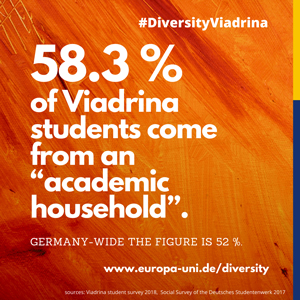 |
The initiative "Arbeiterkind" supports students from non-academic families at Viadrina. What do you think about it?
>> Share your thoughts on this subject with us here, voluntarily and anonymously. |
|
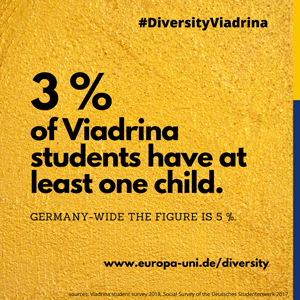 |
Yes, you can find them, the students with child, who use the high chairs in the canteen and the changing table in the toilets. Their school and university schedule is tight and sometimes they have to bring their child to the presentation meeting. It is not a large group, but one that has even more to arrange than study, part-time jobs and party calendars.
The Viadrina sees itself as a family-friendly university and offers support for students with children through the family office. Do you know someone who is studying with kids? What do you admire about them? Do you study with child? What does this mean for you and where could the conditions be improved? |
>> Share your thoughts on this subject with us here, voluntarily and anonymously. |
|
| Being international is one significant characteristic of Viadrina – the percentage of international students is so high that other universities dream of it. For many students a stay abroad is mandatory in their curriculum, as well as the learning of foreign languages. There are double degrees and summer schools, the college that prepares foreign students for their studies and staff exchange for employees.
The International Affairs Department supports incoming and outgoing students and coordinates the approximately 250 partnerships worldwide. Interstudis and Buddys welcome the international students, "Fremde werden Freunde" ("Strangers become Friends") offers family connections in Frankfurt, peer tutors support the learning process. |
 |
But what does this mean for the daily study routine? Who speaks English and who German? What misunderstandings arise during courses? How do learning and teaching cultures differ? Do national and international students get to know each other? What is life like in Frankfurt (Oder) as BIPoC (Black, Indigenous and People of Color)? What is positive and what is annoying? How easy is it to make friends? Which stereotypes simply cannot be broken? Do you notice stereotypes in yourself? What do you think about them?
>> Share your thoughts on this subject with us here, voluntarily and anonymously. |
|
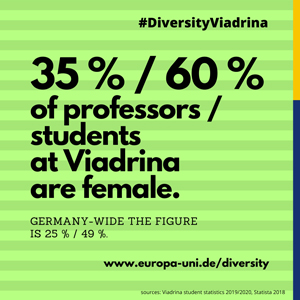 |
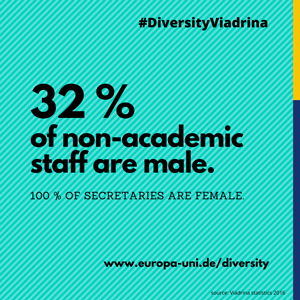 |
Did you know that women have only been allowed to study since 1903?
It is wonderful that so many women study today – at the Viadrina even more than at the average german university! But fewer women are doing their doctorates and even fewer get to be professors.
Since 2011, Viadrina has had an equal opportunities concept and is working to further reduce the structural barriers for women. This takes time, also due to the large number of areas and aspects that deserve attention and need to be addressed, such as stereotypical representations of women in case studies or dominant role of men in the german language.
Do you feel that your gender plays a role in your studies or work? How do you notice this? And how often?
How are those of you who study or work at Viadrina and do not fall into the binary categories of woman or man?
>> Share your thoughts on this subject with us here, voluntarily and anonymously.
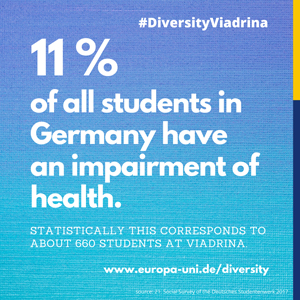 |
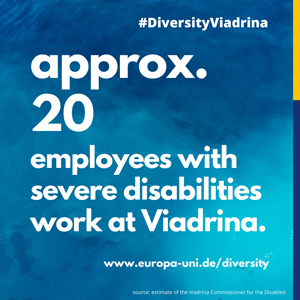 |
One is impaired in health if everyday activities are made more difficult due to long-term physical and/or mental health problems. Some are temporary, some stay, some are visible, some are not. Often it is physical disabilities that come to mind immediately: People in wheelchairs, deaf or blind people. Sometimes people with mental disabilities such as trisomy 21. And what about mental impairments? You can't tell whether people are suffering from depression or an anxiety disorder.
By breaking down barriers that you as a "healthy person" don't even notice, you can often make everyday life easier for people with disabilities – not only with ramps for wheelchair users.
In which situations do physical or psychological problems become noticeable? How does the mental, physical and emotional state of mind influence everyday life, study and work? What barriers do you notice on campus (or in your heads)? Have you had or have you ever had an impairment yourself and asked your fellow human beings for help? Have you ever offered help?
What does it mean for your everyday life at university or at work, for example when you can't concentrate for a long period of time? Or you can never go out for lunch with the others because of intolerances or a stomach disease? What does it mean to study or work with a mental illness?
How many people do you know who have never experienced a physical, mental or psychological restriction in their lives? How many impairments remain hidden? How do you deal with them?
>> Share your thoughts on this subject with us here, voluntarily and anonymously.
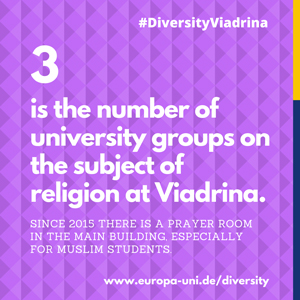 |
Praying between lectures and going to pastoral care in personal crises? Christian theology has been at home in Europe from the very beginning, since the founding of universities in the Middle Ages, as one of the four classical faculties. Worldwide there are universities and educational institutions which are run by religious institutions and yet are open to people of different faiths. In addition, state-secular universities also have student congregations, church services, pastoral care and prayer rooms – not just for one religion.
Does faith play a role for you? Why/why not? If you have moved to Frankfurt (Oder): Are there differences between the place where you grew up and Frankfurt? |
Is religion part of the university? Have you ever prayed at the university? How many people do you know personally who believe in a different religion/belief than you do? With whom did you last talk about religion and what kind of reactions did this provoke? How do you react when people talk about their faith?
>> Share your thoughts on this subject with us here, voluntarily and anonymously. |
|
| These are of course only a few food for thought – the topic of diversity covers much more, for example sexual orientation, gender identity, appearance, skin colour...
Viadrina stands up against any kind of discrimination! Do you have further thoughts on the topic of diversity at Viadrina? Let us know! |
 |
We love our uni-di-versity Viadrina!
|
Diversity at Viadrina – we respect that, that’s what we stand for, that’s what we think is good and that’s what we are committed to.
|
These diversity counseling services are available at the Viadrina to provide advice & support:
- Arbeiterkind.de – group Frankfurt (Oder)
- General Student Committee (AStA)
- Counselling Service for Students with Health Impairments
- Family Affairs Office
- Gender Equality Office
- Psychological Counselling Centre
- Diversity Management
- Viadrina International Affairs
- Department for Equality Affairs
- Central Student Advisory Service

